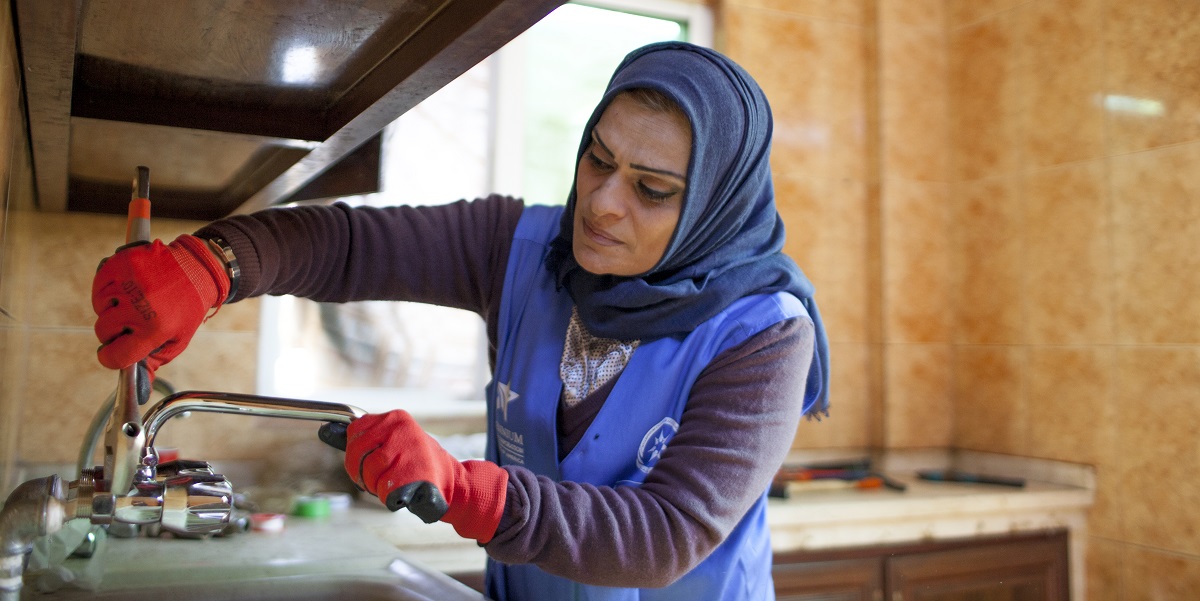Ra’eda projects confidence as she repairs leaky faucets, checks for rust in water tanks, and explains the basics of plumbing maintenance to her clients in Zarqa, Jordan. Ra’eda has an unusual profession for a woman in Jordan: She is a plumber.
As one of 30 women trained as plumbers through an MCC-funded program, Ra’eda and her former classmates are challenging attitudes about women’s roles and professions in Jordan, which has one of the lowest women’s labor force participation rates in the world.

MCC
Ra’eda, one of 30 women trained as plumbers as part of the MCC-Jordan Compact, fixes a client’s faucet in the city of Zarqa. Ra’eda and her colleagues are challenging attitudes about women’s roles and professions in Jordan, which has one of the lowest women’s labor force participation rates in the world.
“People think us incapable of doing such work just because we are women,” said Ra’eda, 47. By now, she is used to skepticism and even “mockery” about her abilities as a plumber, but is proud that it is “replaced by shock at my skill” once people see her work.
Women plumbers in Jordan fill a unique market need. Because of cultural norms, many customers do not feel comfortable having a man plumber visit their home unless a male head of household is also present. This means a husband or son may have to miss work or delay necessary repairs until he can be home, but the inconvenience can be avoided if a woman plumber is hired for the job.
Plumbers are important players in Jordan’s water conservation efforts, which are creating new opportunities for economic growth and business investment to help people lift themselves out of poverty. The country is among the most water poor countries in the world, and when MCC launched its compact partnership with Jordan, it estimated that up to 50 percent of water in the Zarqa network was lost due to leaking pipes.
MCC’s $275 million Jordan Compact invested in strengthening the country’s water infrastructure to power growth and progress. The compact also included an extensive outreach campaign on water conservation and small infrastructure repairs across poor households in Zarqa Governorate, home to more than one million people.
Recognizing that women typically manage water collection and storage in the home, the outreach campaign targeted women as primary agents of change.
“They are the ones that know best how water is being used in the home and how to conserve it,” Ra’eda said.
In addition to promoting the importance of cleaning water tanks and monitoring for leaks in pipes through awareness sessions across her community, Ra’eda was part of a team that provided basic plumbing maintenance training and toolkits to more than 3,000 women. Her favorite part of the experience was seeing the smiles on women’s faces after their household water tanks and pipes were repaired.
Zarqa’s vibrant women’s networks and non-governmental organizations were essential to the outreach campaign’s success. Water conservation messages and tips were communicated through awareness sessions, social media and traditional media channels. The awareness sessions reached more than 14,000 of the poorest women in Jordan and tens of thousands more. Teaching sessions for elementary school children featured an educational video, branded water bottles, and take-home flyers for parents.
Today, Ra’eda is self-employed and works about 15 hours a week as a plumber serving 50 clients in the Zarqa area. She travels to work sites by taxi and often charges less than her male counterparts to expand her clientele. In addition to households, beauty salons and women’s gyms are among her clients.
By gaining valuable skills and breaking into a non-traditional field for women, Ra’eda and her classmates are expanding the realm of possibilities for women in Jordan. Ra’eda has been invited to give lectures and trainings on plumbing to local associations, and “women are now eager to give plumbing a try,” she said.
She credits MCC’s investment for providing her with the practical experience she needed to gain more courage and self-confidence to help the most vulnerable households in her community get crucial plumbing repairs that are aiding water conservation. In addition to plumbing training, she received business start-up and marketing know-how, and vital equipment like a plumber toolbox, business cards, and a cell phone. Some of Ra’eda’s classmates have become friends and important sources of support as the women look for opportunities to take their work to the next level.
Before the five-year MCC-Jordan Compact came to an end, the agency partnered with USAID’s Local Enterprise Support Project to further support the women plumbers in starting their own businesses, building on the business development training MCC provided. Through the project, Ra’eda and others will work to develop plans that will serve as the basis for qualifying to receive business start-up grants from USAID. The project will also support the organization and establishment of a trade association or help the women join an existing Women Plumbers Cooperative.
“I just have one dream,” Ra’eda said. “Acquiring my own plumbing shop and hiring some women to join my team.”
Check out more stories, videos and graphics about the Jordan Compact on our feature page.

